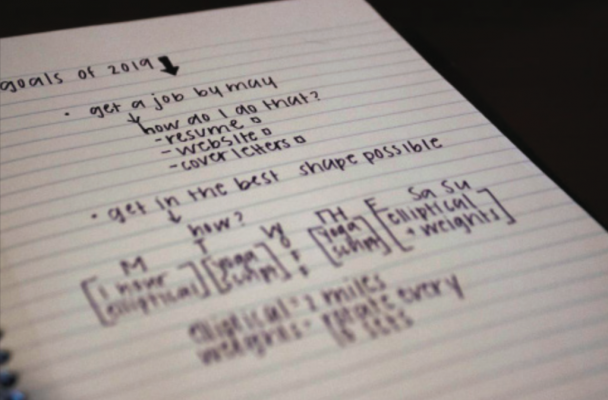How to stay true to your new years resolutions and goals

By Nicole Prince// Staff Writer
With a show of hands, how many of you have been inconsistent with your New Year’s resolutions? How many of you have not even started? “January doesn’t count; it’s just a trial run.” Am I right?
Let us pause to reflect: What is causing your delay or lack of commitment? What if there is a better way to keep up with your New Year’s resolutions? Should you stop making resolutions altogether?
Forbes’ statistics show that “less than 25 percent of people actually stay committed to their resolutions after just 30 days, and only 8 percent accomplish them.” There must be another way to combat #thestruggle. Forbes’ trending tweet suggests setting goals instead of resolutions.
What are the differences between resolutions and goals?
Resolutions tend to be nonspecific and unmanageable. Instead of making simple, realistic resolutions, people make the mistake of trying to change their entire lifestyle all at once which typically leads to discouragement and giving up. Sometimes resolutions have direction but no initiative. Knowing what you resolve to accomplish holds little value without also knowing how you are going to do so.
Goals express more specificity, be they short-term or long-term. They involve step-planning and responsibility. Instead of thinking about what you want to do, decide what you want to do and how you are going to do it; maybe even why. In doing so, goals can encourage more accountability and consistency compared to resolutions. Goals should also be realistic. Instead of writing down a page full of aimless and highly ambitious wants, choose a few, more attainable ones and plan them out accordingly.
Here are some examples to validate this approach:
Don’t say, “I want more time for myself.” Say, “I will use at least thirty minutes of each day to practice self-care, (be it reading, napping, meeting up with a friend, relaxing with a self-spa treatment and aromatherapy scrubs, or exercising), because I deserve it.”
Don’t say, “I want to eat healthier.” Say, “I will not indulge in late-night binge eating and exchange at least one fast-food meal, per day, with a healthier one because I want more energy, clearer skin, and better sleep.”
Ashira Prossack, millennial, Gen Z engagement expert, speaker, and contributor to ForbesWomen, cleverly said it best in her proposal, “This year, if you absolutely must set a New Year’s resolution, make it to set a goal.”
Regardless of whether you prefer resolutions to goals or vice versa, it is important to remember a few things: progression, optimism, and authenticity. Believe in the little victories along your journey, between the beginning and end. You may not get to the finish line when you planned to, but the progress you made should be acknowledged. Putting pressure on yourself leads to the juggling of negative outlooks about what you are not achieving instead of what you are achieving. Evaluate your “why” with honesty. Why are you working towards what you are working towards? Keep your reason(s) in mind. Are you doing it for yourself or the expectations of others? If you are not honest with yourself, your resolutions or goals can quickly turn from priorities to obligations and from enthusiasm to indifference.
Be sure to check in with yourself and think about the broad resolutions you may have already made. Adapt them into realistic and specific goals. Stick to them, and give yourself credit along the way. Albert Einstein said, “Insanity is doing the same thing over and over again and expecting different results.” Make this year different; make it something to be proud of. Cheers to a new year and a new semester at High Point University, where you can strive and thrive with your 2019 goals!
The best thing you can do is write down your goals to really understand how you need to go about achieving them. Photo by Ann Shelley